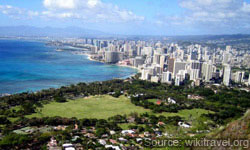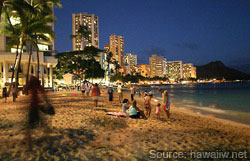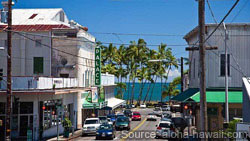 Beautiful beaches, majestic mountains, gorgeous palm trees, tropical breezes and never-ending sunshine make the far-off land of Hawaii a breath-taking paradise, a common honeymoon destination and the place to visit on many Americans' bucket lists. Millions may dream of the chance to live year-round in the midst of this beauty, but few ever make it a reality. If you are planning a move to Honolulu, the most populous city in Hawaii, consider yourself lucky!
Beautiful beaches, majestic mountains, gorgeous palm trees, tropical breezes and never-ending sunshine make the far-off land of Hawaii a breath-taking paradise, a common honeymoon destination and the place to visit on many Americans' bucket lists. Millions may dream of the chance to live year-round in the midst of this beauty, but few ever make it a reality. If you are planning a move to Honolulu, the most populous city in Hawaii, consider yourself lucky!
The city is located on the southeastern shore of the island Oahu in Hawaii. Perfectly balmy weather nearly year-round, diverse culture, unique history, beautiful tropical surroundings and delicious cuisine can make Honolulu appear to be heaven on earth. However, as with every great city, it is a good idea to be well-informed of the area before you make the final decision to relocate. The following guide will tell you everything you need to know about moving to the lovely city of Honolulu.
Honolulu Climate
The sublime weather in the city is a major factor that keeps tourists flocking there in droves. Honolulu experiences sunshine 278 days out of the year, with only 17 inches of rain falling--mostly in the months between October and April. Temperatures vary very little throughout the year. Average high temperatures range between 80 and 90 degrees, and rarely drop below 65. The lowest temperature on record in Honolulu was 52 degrees in 1969.
As if this didn't already sound too good to be true--despite being located in the tropics, Honolulu rarely experiences any hurricane activity. The last recorded hurricane was the Category 4 storm Hurricane Iniki in 1992.
Honolulu Neighborhoods
The city is comprised of many distinct neighborhoods. Downtown Honolulu is the business, governmental and cultural center of Hawaii. Located on the ocean front, the 184-foot Aloha Tower provides a 360-degree view of the city and is surrounded by 38 shops and restaurants. The Aloha Tower Marketplace provides shopping, dining and entertainment and is a popular stop for cruise liners and tourists. Chinatown is located just east of the river and features numerous markets selling fresh produce, exotic Asian fruits and seafood. Authentic Chinese dim sum restaurants, noodle houses, and homemade lei-makers on the streets give this neighborhood its charm, but be wary visiting after dark. While perfectly safe during the day, Chinatown has a reputation for being a bit dangerous at night.
 The tourism center of Hawaii is Waikiki, home to Hawaii's most popular beaches and hundreds of high-rise hotels. The ancient volcanic crater Diamond Head overlooks the white stretch of sand where you can receive surfing lessons, attend a luau, or just lay out and bathe in the plentiful sunshine. Waikiki is also home to a plethora of restaurants, bars and nightspots that will keep any local or tourist busy well into the late hours of the night.
The tourism center of Hawaii is Waikiki, home to Hawaii's most popular beaches and hundreds of high-rise hotels. The ancient volcanic crater Diamond Head overlooks the white stretch of sand where you can receive surfing lessons, attend a luau, or just lay out and bathe in the plentiful sunshine. Waikiki is also home to a plethora of restaurants, bars and nightspots that will keep any local or tourist busy well into the late hours of the night.
Registering Your Car
If you plan on bringing your car to Hawaii, you will need to update your registration within 30 days of arriving. The state requires you to have your car inspected and insured with a carrier that does business in Hawaii. The inspection fee is $15 but the fees for registration will vary depending on the weight of your vehicle. If you are moving from out of state, you will need your shipping document (Bill of Lading), shipping receipt, and out of state registration card.
Honolulu Schools
Because of Hawaii's low population, the schools in the city are operated by the Hawaii State Department of Education, the only statewide public education system in the country. The system is surrounded by controversy, with Republican officials striving to centralize the districts and democratic officials preferring the current comprehensive system.
Honolulu is also home to several universities, including the University of Hawaii of Manoa, Chaminade University, and Hawaii Pacific University.
Honolulu Employment
The city's biggest industry is tourism, which rakes in a booming $10 billion in revenue annually. In addition to the hospitality industry, the city's location makes it a hub for business and trading. Other major industries in Honolulu include health care, research and development, manufacturing and military defense.
Major employers in the city are: Bank of Hawaii, Schofield Barracks, the Honolulu Police Department Queen's Medical Center, Aloha Airlines, The Hilton, The Hyatt, and various other hotels and health centers.
Honolulu Moving Resources
 There are numerous moving and storage companies located in the city that are waiting to help you relocate to your new home. Be sure to do your research and obtain estimates from several different services before choosing one for hire. You can compare online quotes from many different moving companies and other services to aid you in your move, whether you are coming from the next city or overseas. Visit the following pages here at Movers.com to get fast quotes for the following services:
There are numerous moving and storage companies located in the city that are waiting to help you relocate to your new home. Be sure to do your research and obtain estimates from several different services before choosing one for hire. You can compare online quotes from many different moving companies and other services to aid you in your move, whether you are coming from the next city or overseas. Visit the following pages here at Movers.com to get fast quotes for the following services:
Living Costs in the City
The cost of living in the city is high, as with many desirable locations. At a staggering 65 percent above the national average, everything costs more in Honolulu. Groceries, transportation, utilities, health care, and most of all housing (at 135 percent higher than the national average) are all greater than most major cities, with the exception of New York.
Honolulu was named the number one most expensive housing market by CNN in 2011, with a median home price of $579,300. The average rent for a one-bedroom apartment in the city is $1,446, and $1,997 for a two-bedroom.
Honolulu Transportation
The city is served by the public bus transportation service known simply as "The Bus". The Bus provides daily service along 110 routes with 518 buses serving 75.5 million riders each year. It is operated by O'ahu Transit Services in partnership with the City and County of Honolulu Department of Transportation Services.
The city does not currently have a rail system, but construction of a 20-mile transit rail line is in progress. The rail will connect the city to nearby suburban areas, such as those located in the Leeward and West O'ahu regions.
Traffic in the city can become extremely bottled up, earning Honolulu the title of most congested U.S. city in 2012. Many roadways are also very narrow and should be driven with caution by anyone new to the area.
Culture and Contemporary Life
 Hawaii is home to a medley of cultures, and the recreation, dining, and entertainment in Honolulu reflects its diversity. Museums, theatre, shopping, festivals, restaurants and nightspots fill the beautiful city. Since it is such a hotbed for tourism, you will never be bored in Honolulu.
Hawaii is home to a medley of cultures, and the recreation, dining, and entertainment in Honolulu reflects its diversity. Museums, theatre, shopping, festivals, restaurants and nightspots fill the beautiful city. Since it is such a hotbed for tourism, you will never be bored in Honolulu.
The Bishop Museum features the greatest collection of Polynesian artifacts in the world, and the Honolulu Academy of the Arts houses exhibits from the Orient and a collection of Italian Renaissance paintings. The city's many festivals also celebrate its array of cultures. The Chinese New Year is commemorated with the Narcissus Festival in Chinatown. Traditional lion dancers, firecrackers, food, arts and crafts, and a parade throughout the city are just a few of the festivities. Other popular festivals in the city include The Honolulu Festival in March to celebrate ethnic harmony, The Hawaii State fair, held every weekend from mid-May to mid-June at the Aloha Stadium, and The Pan Pacific-Matsuri Festival in June, which promotes mutual understanding between Hawaiian and Japanese cultures.
The city is also a pleasure for any shopaholic. The Aloha Tower Marketplace is a waterfront plaza boasting numerous shopping and dining options. The Ala Moana is one of the largest open-air shopping centers in the world, with more than 240 stores, restaurants and entertainment venues. The Diamond Head Farmer's Market is the island's most famous convention of farmers and their loyal customers that return to buy popular products such as Don Akiyama's jams and North Shore's Big Wave Tomatoes.
Honolulu Relocation Tips
Moving to Hawaii is much different than moving to any other state on the mainland. The demographics, cultures and lifestyle may all take some getting used to for a new resident. The following are some tips on how to ease your transition when moving to Honolulu:
-
Get a map. Roadways in the city are very confusing. They don't use the "grid system" as in most other cities; instead, streets twist and turn throughout the city. Additionally, traffic can get very bad, so knowing where you are going will ease your stress when stuck in a traffic jam on your way to your first day of work.
-
It's expensive. Living in the city can be very costly, so be prepared.
-
Get your license as soon as you can. There is only one place on the island where you can get a driver's license. It is located in Kalihi, and you may sometimes have to wait in line all day.
-
Be wary of certain neighborhoods at night. Hawaii may be paradise, but it is not without crime. Certain neighborhoods, such as Chinatown, can be unsafe after dark. Petty theft is also a big problem in the city, so when you’re out and about, keep all valuables on your person or concealed and locked up in your vehicle.